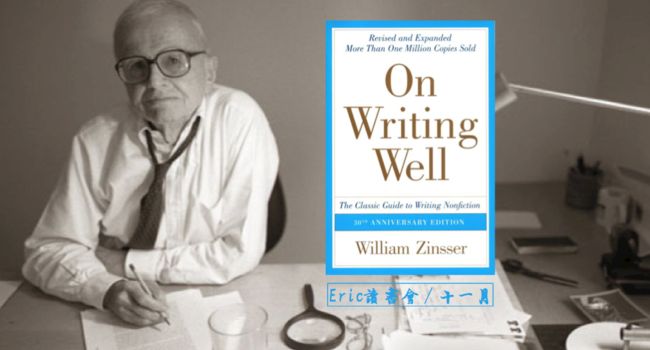PART 1 Gist
Chapter 3 : Clutter
Clutter is the laborious phrase that has pushed out the short word that means the same thing. Every profession has the tendency to use jargons and confuse the public. The secret of good writing is to avoid clutter. As suggested by the author, do not inflate what needs no inflating. In order to recognize clutter at a glance, the author would put brackets around every component in a piece of writing that wasn't doing useful work.
Chapter 4 : Style
Finding or adding a style could only render the writer unlike himself. Readers want the person who is talking to them to sound genuine. Therefore a fundamental rule of good writing is to be yourself. Writing is an act of ego. Writers must learn to relax and have confidence. Writing in the first person could do the trick. If you aren't allowed to use "I", at least think "I" while writing, or write the first draft in the first person and then take the "I"s out. It would warm up the impersonal style.
PART 2 Expressions
1. The personal friend has come into the language to distinguish him or her from the business friend, thereby debasing both language and friendship.
debase: to make sb or sth lose its value or people's respect
The medical profession has been debased by these revelations.
debase oneselfeg. actos who debased themselves by participating in the show
debase a currency/ coinage: reduce its value
2. Companies that go belly-up have a "negative cash-flow position."
go belly up:informal, if a business or company goes belly up, it stops operating because it cannot pay its debts 破产
I really cannot afford to see this company go belly up.
3. We must push this to a lower decibel of public fixation.
decibel: [ˈdesɪbel] (声音)分贝
fixation:a very strong interest or love for sb or sth that is not natural or healthy 偏执的爱;情结
fixation on/ with/ about sth
Carlo has an absolute fixation with the loyal family.
a mother fixation 恋母情结
4. But you will be impatient to find a "style" -- to embellish the plain words so that readers will recognize you as someone special.
This is the problems of writers who set out deliberately to garnish their prose.
embellish [ɪmˈbelɪʃ]: 装饰;修饰
The dress was embellished with gold threads.
She gave an embellished account of what had happened.
garnish: to add sth to food in order to decorate it
Garnish each dish with a slice of lemon.
5. The reader will notice if you are putting on airs.
put on airs/ give yourself airs: airs这里指的是“高人一等的口气/姿态”, a way of behaving that shows sb thinks they are more important than they really are
Trudy is always putting on airs.
an actor with no airs and graces (n.)装腔作势
6. You think how august it will look in print.
august: impressive and respected 威严的;令人敬畏的
an august institution
7. "I" can be a self-indulgence and a cop-out.
cop-out: (n.) something that you do or say in order to avoid doing or accepting something 逃避的借口
Ignoring the problem is a cop-out.
cop out: (v.) to not do sth that sb thinks you should do
As far as I'm concerned, she's copped out and joined the rat race.
Born a Crime 里有一个类似的表达: runaround
8. Americans are unwilling to go out on a limb.
out on a limb: alone and without help or support
go out on a limb = take a risk
All the other countries signed the agreement, leaving Britain out on a limb.
He'd gone out on a limb to help us.
9.Watch them wriggle through TV interviews without committing themselves.
wriggle: [ˈrɪgl] 扭动;蠕动;设计摆脱
She wriggled out of her dress.
She took off her shoes and wriggled her toes.
wriggle out of sth: to avoid doing sth by using clever excuses SYN get out of sth
Don't try to wriggle out of your responsibilities.
wriggly: (a.) a wriggly worm
10. I give it the first prize as the most wishy-washy sentence in modern public discourse.
wishy-washy: 【贬义】1.(衣服颜色/ 饮料味道) 淡的 pale and unexciting, not strong or dark; 2. 空洞无聊的 someone who is wishy-washy does not have firm or clear ideas and seems unable to decide what they want
a bunch of wishy-washy liberals
If there's anything I can't stand, it's an indecisive, wishy-washy customer.
PART 3 Thoughts
You think your article must be of a certain length or it won't seem important. You think how august it will look in print. You think of all the people who will read it. You think that it must have the solid weight of authority. You think that its style must dazzle. No wonder you tighten; you are so busy thinking of your awesome responsibility to the finished article that you can't even start.
读到这段话的时候不自觉地对号入座了。我每次写文章花费时间最长的并不是动笔写的过程,而是动笔前的构思。高中时候每次语文考试最后常常完成作文以前的部分还剩下五十分钟的时间,但是我经常打草稿就打去了15分钟时间,然后剩下的三十五分钟草草地写下一千多字。“良好的开头是成功的一半”这句话固然有道理,但是很多时候却成了一种自我束缚的魔怔,我常常会潜意识里觉得如果没有想到一个夺人眼球的开头整篇文章就会黯然失色。在这一章里William Zinsser所提出的核心观点就作家要保持自我,真实的自我才是最好的风格。而在写作时不必纠结与要写出一个完美的开头,而且往往前两段作家矫揉造作的成分过多而后面更加流畅自然,因而好的编辑往往会从文章的中间部分即作者的个人性显现的部分开始摘选。Zinsser的这一观点让我想到了老舍,他的每一篇文章的开头都像是不加构思信笔写来,也从不考虑前后呼应什么的,但却让人觉得很亲切很舒服。比如《想北平》的开头是“设若让我写一本小说,以北平做背景,我不至于害怕。因为我可以捡着我知道的写,而躲开我所不知道的。” 这样的开头就像Zinsser说的,会让读的人有这样的感受"Aha! A person!"。
